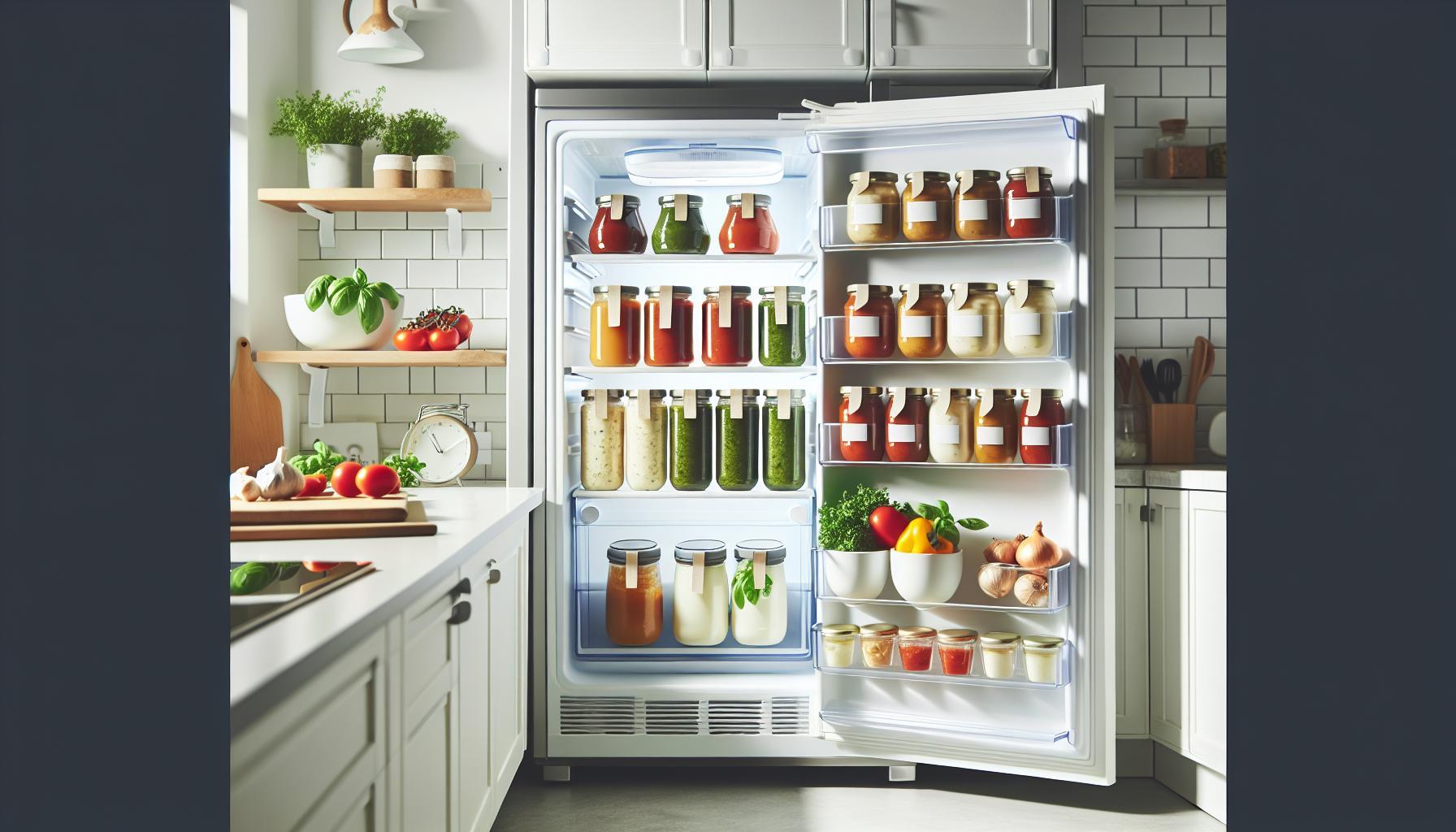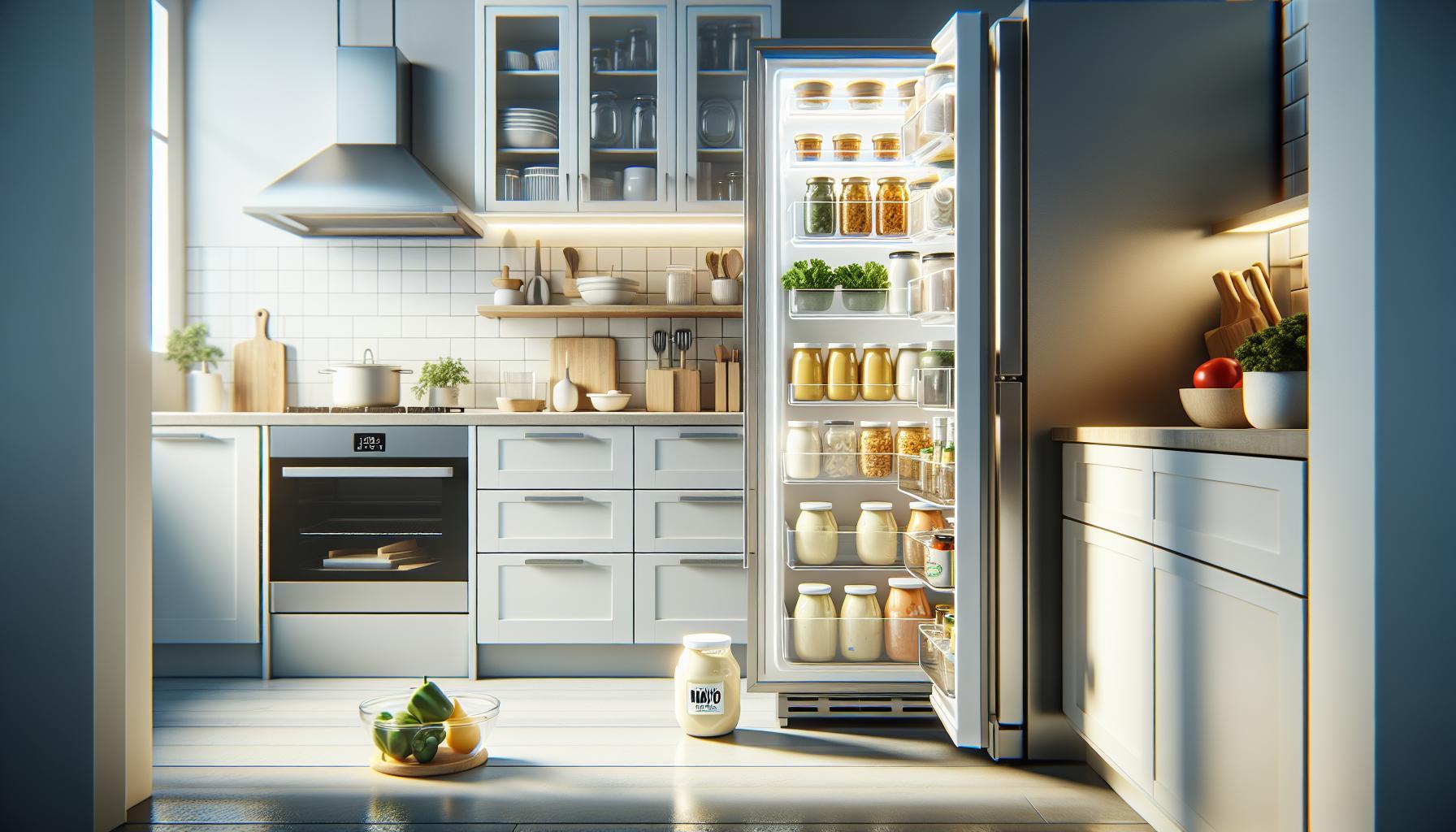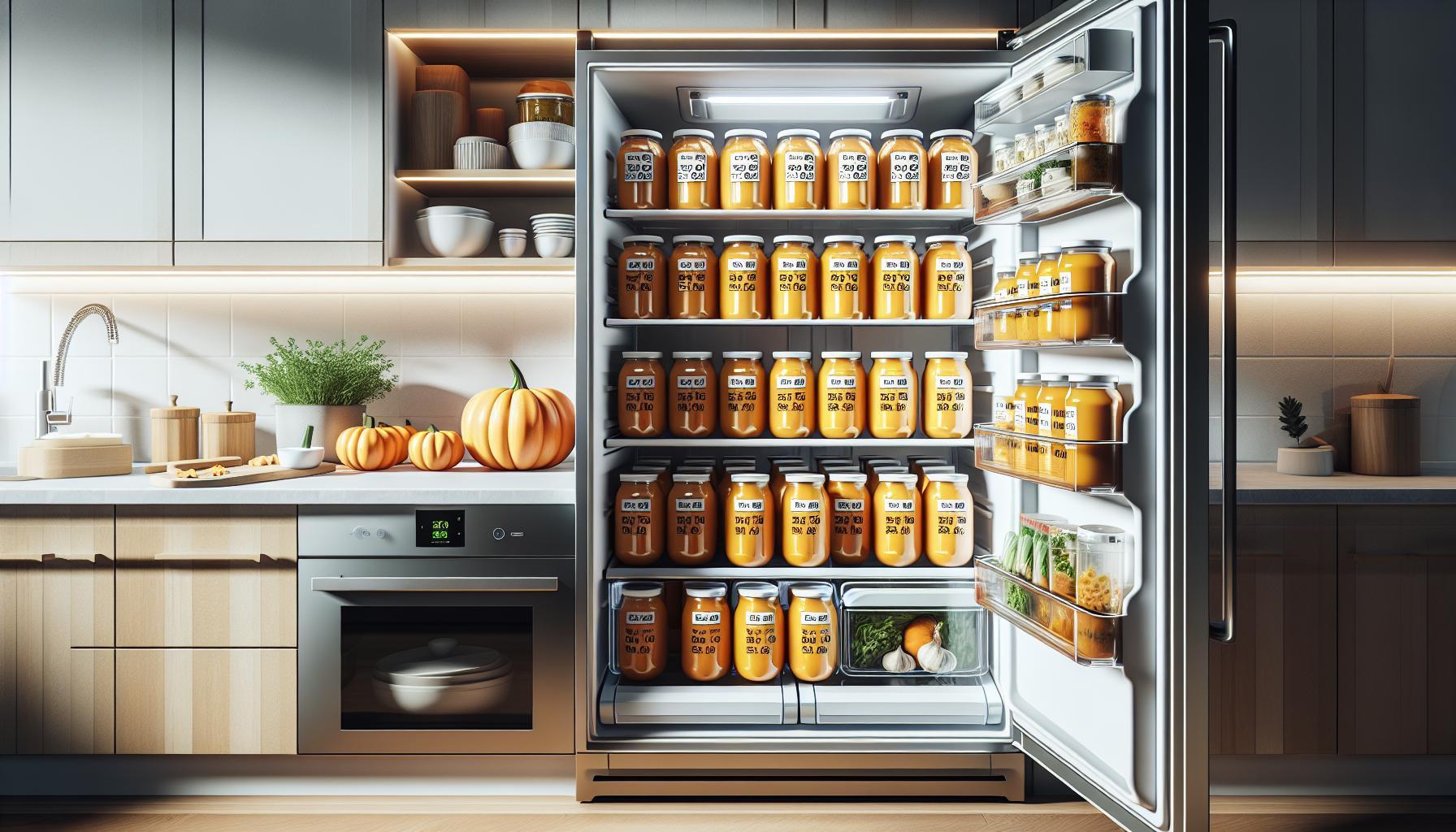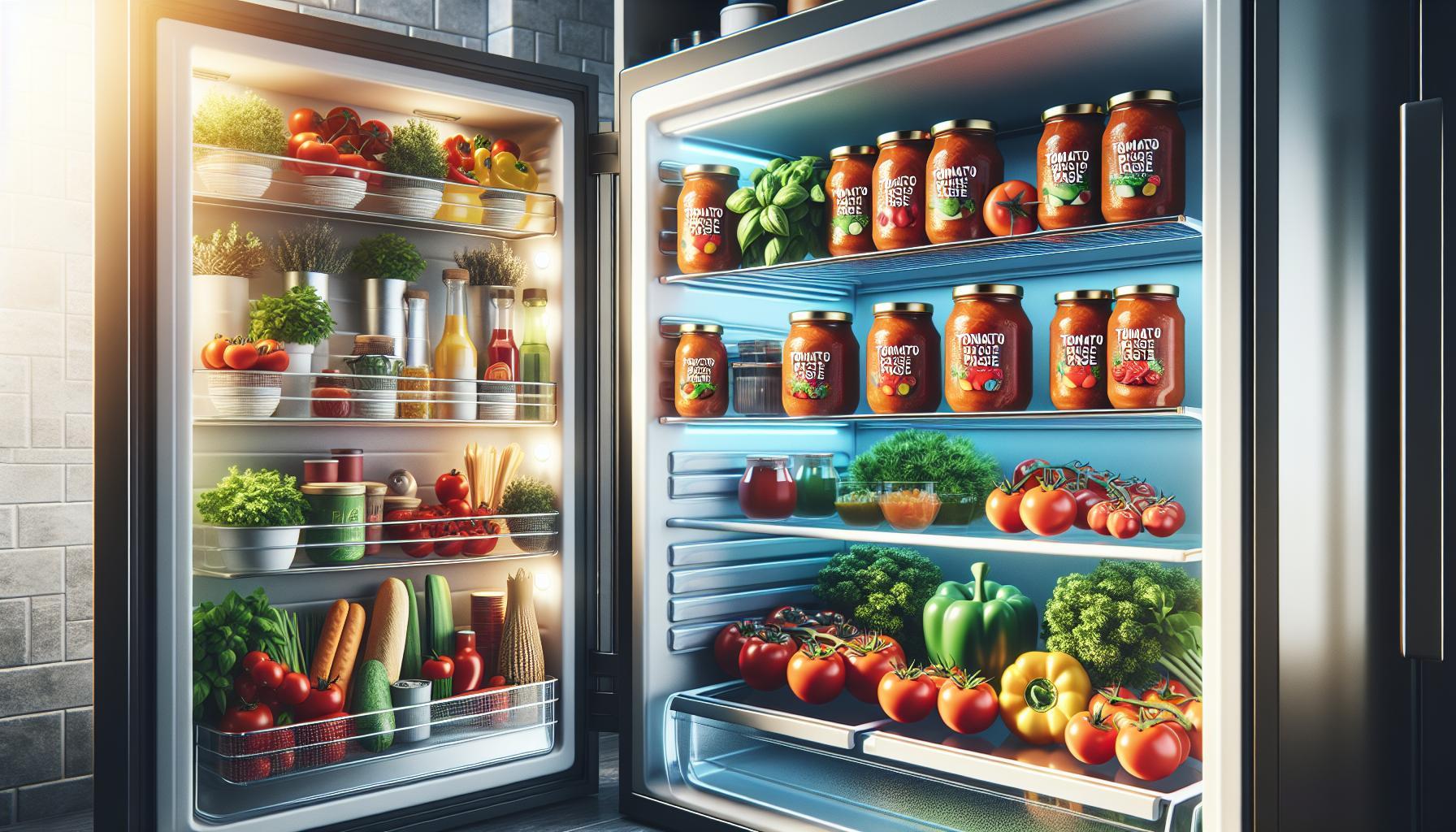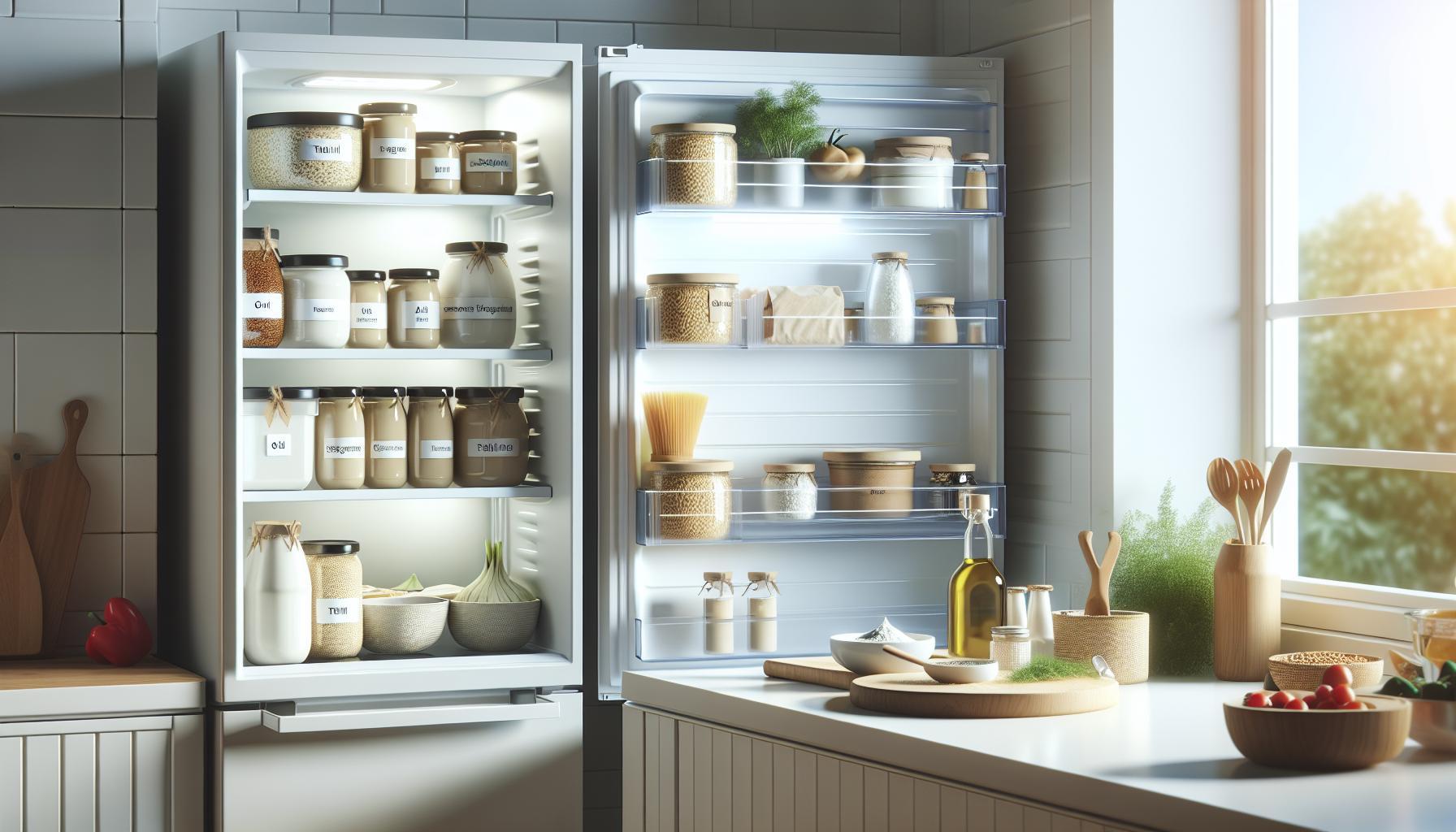Homemade sauces can elevate any dish, but knowing how long they last in the fridge is essential for both safety and flavor preservation. Typically, a well-prepared sauce will maintain its quality for about 3 to 5 days. However, factors like ingredients and storage methods can greatly influence this timeframe.
Many home cooks dread the thought of food waste, and asking, “Can I use that sauce again?” is common. Understanding the shelf life of your homemade creations not only helps you avoid spoilage but also allows you to enjoy the rich, flavorful rewards of your kitchen efforts to the fullest.
In the following sections, we’ll delve into practical tips for maximizing the longevity of your sauces, ensuring every drop is safe and delicious. Get ready to unlock the secrets of sauce preservation and make the most of your culinary creations!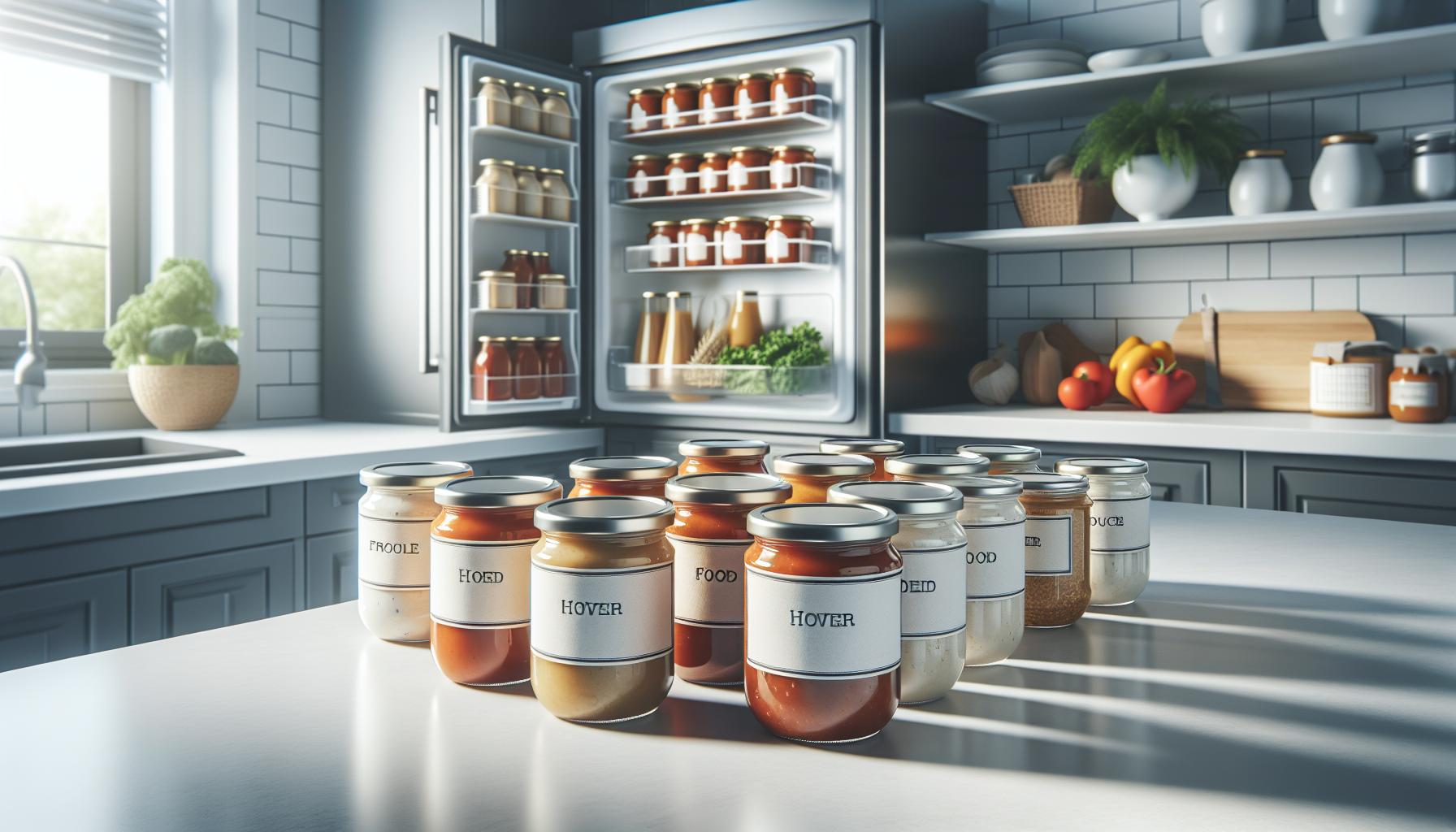
How Long Can Homemade Sauce Be Stored?
After preparing a delicious batch of homemade sauce, the adventure doesn’t end in the kitchen. Properly storing your sauce can ensure it retains its flavors and quality for as long as possible. Generally, homemade sauce can be stored in the refrigerator for 3 to 5 days. During this time, it remains safe to eat, provided it has been stored under the right conditions.
To maximize freshness, always store your sauce in an airtight container to minimize exposure to air, which can lead to oxidation and spoilage. Additionally, ensure the sauce has cooled down to room temperature before sealing it, as placing hot sauce directly into the refrigerator can raise the internal temperature, potentially affecting other stored foods. If you find that you won’t be able to eat the sauce within the week, freezing is an excellent option. Properly frozen, homemade sauce can last for up to 3 months, allowing you to enjoy that homemade goodness even longer.
When it comes to sauces, different varieties may have varying shelf lives. Tomato-based sauces typically last a bit longer due to their acidity, while cream-based ones may spoil faster. It’s essential to assess the ingredients in your sauce and adjust your storage times accordingly. By keeping these guidelines in mind, you can ensure that your homemade sauces stay flavorful and ready to elevate your meals whenever you need them.
Ideal Storage Conditions for Sauce
Storing homemade sauce properly is essential to preserve its flavors and prevent spoilage. To ensure that your sauce remains safe to consume and delicious over its lifespan, focus on two key elements: temperature and container choice. Ideally, your refrigerator should be set at or below 40°F (4°C), as this temperature significantly slows down bacterial growth. For sauces that you intend to store for short periods, keeping them in the fridge directly after cooking can help maintain optimal freshness.
Container Choices
Using the right storage containers is equally important. Here are some tips on what to look for:
- Airtight Seals: Select containers with airtight lids to keep out moisture and air, both of which can lead to spoilage.
- Glass vs. Plastic: Glass containers are generally preferred because they do not hold odors and are less likely to stain from sauces, especially those with tomatoes or spices.
- Portion Control: Consider dividing larger batches into smaller containers. This way, you only need to open one at a time, reducing exposure to air and helping maintain the flavor of the remaining sauce.
Cooling Before Storage
Before sealing your sauce for storage, let it cool to room temperature. Placing hot sauce directly into the fridge can elevate the temperature inside, affecting the safety of other foods stored within. After the sauce has cooled, transfer it to your chosen airtight container and mark the date on the lid or a piece of tape; this simple step can help track the freshness over time.
Freezing for Longevity
If you anticipate not using the sauce within the recommended 3 to 5 days in the fridge, freezing it is a fantastic option. When properly frozen, homemade sauce can be stored for up to 3 months. To freeze, allow the sauce to cool completely, then follow similar principles for container choice, ensuring it’s in a freezer-safe container. Leaving some space at the top of the container allows for expansion as the sauce freezes, preventing any spills or breakage.
By adhering to these storage guidelines, you can extend the life of your homemade sauces while preserving their delicious flavors, making sure that every meal stay as delightful as the day you made it.
Signs Your Sauce Has Gone Bad
Identifying whether your homemade sauce has gone bad is crucial for both flavor and health. Spoiled sauces can harbor harmful bacteria, which can lead to foodborne illnesses. So, it’s essential to be vigilant about the signs that indicate your sauce has reached its expiration point.
One of the most noticeable indicators is unpleasant odors. Fresh sauces typically have aromatic scents that can range from savory to sweet, depending on their ingredients. If you detect a sour, off, or rancid smell, it’s a strong signal that the sauce is no longer safe to eat. Additionally, visual changes can alert you to spoilage; for instance, if mold appears on the surface or if you notice any unusual discoloration-like a dull, brownish hue in a tomato sauce-it’s best to discard it.
Another important factor to consider is texture. If your sauce has developed a slimy or unusually thick texture, it may be a sign of bacterial growth. Sauces should maintain a viscous but smooth consistency. Furthermore, if you’ve stored your sauce for more than the recommended time-3 to 5 days in the refrigerator, or up to 3 months in the freezer-always err on the side of caution and dispose of it, even if it appears fine.
In summary, if your sauce smells off, shows signs of mold or discoloration, has an unusual texture, or has been stored for too long, it’s safer to throw it away. Trust your senses and prioritize safety to prevent any unpleasant experiences while enjoying your culinary creations.
How to Properly Freeze Homemade Sauce
Freezing homemade sauces is an excellent way to preserve their freshness and flavor for later use, ensuring that you can enjoy your culinary creations long after they’ve been made. Proper freezing methods can significantly extend the shelf life of your sauces, allowing you to savor the taste of your kitchen experiments whenever you desire.
To begin, the first step is to cool your sauce to room temperature. This is critical because placing hot sauce directly into the freezer can raise the temperature inside, potentially affecting other frozen items. Once it has cooled, transfer your sauce into airtight containers or freezer bags, ensuring to leave about an inch of space at the top of your containers to allow for expansion as the sauce freezes. For more convenient meal portions, consider freezing sauce in types of containers such as ice cube trays. Once frozen, you can transfer the cubes into a freezer bag for easy access later.
When labeling your containers, include the date and type of sauce to track storage time effectively. Most homemade sauces can be stored in the freezer for up to three months without sacrificing quality. However, some sauces, particularly meat-based ones, may lose their texture or flavor if stored for too long, so it’s wise to use them within two months for the best experience.
When you’re ready to use your frozen sauce, simply transfer it to the refrigerator to thaw overnight or place it straight in a saucepan over low heat until warmed through. For sauces that are too thick after freezing, you can add a splash of water or stock to help restore the desired consistency. This careful attention to freezing methods and proper thawing can help keep your homemade sauces as delicious as the day they were made, making meal preparation quick and convenient.
Reviving Flavor in Stored Sauce
Flavor can diminish over time in stored sauces, but there are numerous ways to bring them back to life. Understanding how to enhance the taste of your homemade sauce can transform a basic meal into a culinary delight, even when using leftovers. This approach not only saves you money but also minimizes food waste, making it a win-win situation.
To effectively revive the flavor of your stored sauce, start by assessing its base. If the sauce has thickened during storage, add a splash of broth, stock, or even a little water to restore its original consistency while boosting flavor. Additionally, consider incorporating fresh or dried herbs and spices. A pinch of salt can enhance overall taste, while fresh ingredients like garlic, onions, or bell peppers can introduce vibrant notes that were lost during storage. Using acid, such as a squeeze of lemon juice or a dash of vinegar, can also brighten the flavors significantly.
In some cases, blending your sauce may renew its texture and flavor. For chunky sauces, a pureeing step can create a smoother blend that mixes flavors better. For those with a more liquid consistency, a quick simmer on low heat may encourage the ingredients to meld and reintroduce depth. If you’d like to incorporate a twist, consider adding ingredients like grated cheese, cream, or even a bit of wine to enhance richness and complexity.
Always taste your sauce throughout the reviving process, adjusting seasonings as needed. This will ensure a balanced flavor profile that caters to your palate. By following these simple techniques, you can easily breathe new life into stored sauces, making quick meals satisfying while retaining the quality and taste you expect from homemade creations.
Types of Sauces and Their Shelf Life
Understanding the shelf life of different types of sauces can help you minimize waste and ensure that your homemade creations are always safe and flavorful. Generally, sauces can be categorized based on their ingredients and preparation methods, influencing how long they can be stored in the refrigerator. For instance, cream-based sauces typically last about 3 to 5 days, while tomato-based sauces can last up to a week when properly stored. On the other hand, sauces that are vinegar or oil-based, such as pesto or dressings, may enjoy a longer shelf life of 1 to 2 weeks.
Here’s a quick overview of common sauce types and their respective shelf lives:
| Type of Sauce | Storage Duration in the Fridge |
|---|---|
| Tomato-based sauces (e.g., marinara, spaghetti) | 5 to 7 days |
| Cream sauces (e.g., Alfredo, carbonara) | 3 to 5 days |
| Pesto (basil, sun-dried tomato) | 1 to 2 weeks |
| Vinaigrettes | 1 to 2 weeks |
| Hot sauces | 6 months to 1 year |
| BBQ sauce | 1 to 2 months |
Proper storage conditions are key to extending these timelines and keeping your sauces as fresh as possible. It’s advisable to store sauces in tightly sealed containers, as exposure to air can lead to faster spoilage. If there are any signs of spoilage-such as off odors, discoloration, or mold-it’s best to err on the side of caution and discard the sauce. Being mindful of the specific ingredients in each sauce will help you determine whether it’s still good to use or if it’s time to whip up a fresh batch.
Tips for Extending Sauce Freshness
Keeping homemade sauces fresh for as long as possible can save time and reduce waste, making your cooking experience more enjoyable and efficient. One of the best ways to maintain the quality of your sauces is through proper storage techniques. Start by using airtight containers to prevent air exposure, which can lead to oxidation and spoilage. Glass jars or plastic containers with tight-fitting lids are excellent choices, as they help to seal in freshness and flavor.
Use Quick-Chill Methods
After preparing your sauce, allow it to cool to room temperature before refrigerating it. To facilitate faster cooling, divide the sauce into smaller portions or spread it out in shallow containers. This not only speeds up the cooling process but also helps it reach a safe temperature faster, reducing the risk of bacterial growth. Aim to refrigerate your sauce within two hours after cooking to ensure it’s stored safely.
Label and Date Your Sauces
Once your sauces are in containers, take a moment to label them with the name and date of preparation. This simple step will help you keep track of their shelf life and ensure you use them within the recommended timeframes. Remember that tomato-based sauces typically last 5 to 7 days, while cream sauces should be consumed within 3 to 5 days. By monitoring their freshness, you can enjoy your homemade creations at their peak flavor.
- Use vinegar or acid: Incorporating acidic ingredients like lemon juice or vinegar can help extend the freshness of sauces.
- Avoid double-dipping: Always use clean utensils when scooping out sauce to prevent contamination.
- Freeze for long-term storage: If you’re unable to use your sauce within the suggested timeframe, consider freezing it for up to 3 months. Just be sure to leave some space in the container for expansion as the sauce freezes.
By implementing these strategies, you will not only prolong the life of your sauces but also retain their vibrant flavors, allowing you to enhance your meals with ease and confidence.
Storage Containers: The Best Choices
Choosing the right storage containers for your homemade sauces is crucial to maintaining their freshness and flavor. Not all containers are created equal, and the right choice can mean the difference between a vibrant sauce ready to enhance your meals and a bland or spoiled concoction. Glass jars are often recommended due to their non-reactive properties, which prevent any interaction with the acidic ingredients commonly found in many sauces. They are also airtight and allow you to easily see what’s inside. Opt for mason jars or other glass containers with rubber seals for an optimal seal.
Plastic containers are another convenient option, especially for those who need lightweight and space-saving solutions. Look for high-quality, BPA-free plastic that is freezer-safe. Many food storage containers come with tight-fitting lids which can significantly reduce the risk of air entering and oxidizing your sauces. To extend freshness, freeze sauces in individual portions using muffin tins or silicone ice cube trays, then transfer to a zip-top bag for long-term storage. This way, you can easily thaw only what you need.
Special Considerations
When labeling and dating your containers, be mindful of the materials used, especially if you’re using plastic. Some plastics can warp or discolor, particularly when exposed to heat. Avoid using containers that previously held non-food items, as lingering odors or residues could affect the taste of your sauce. Inspect your containers regularly for scratches or cracks, which can harbor bacteria, and replace them as necessary to ensure food safety.
In summary, your choice of storage container has a direct impact on the longevity and flavor retention of your homemade sauces. Prioritizing glass jars or high-quality plastic containers with airtight seals will help keep your sauces fresh and delicious for as long as possible. Remember, taking the time to select the right containers and employing good storage practices is key to enjoying your cooking creations at their very best.
Common Mistakes to Avoid When Storing
Improperly storing homemade sauces can significantly reduce their shelf life and alter their taste, leaving you with a less-than-ideal culinary experience. One common mistake is not allowing sauces to cool completely before storage. Pouring hot sauce directly into containers can create condensation, leading to a watery texture and favoring bacterial growth. It’s best to let your sauce reach room temperature and then transfer it to airtight containers to maintain optimal freshness.
Another frequent error is neglecting to label and date your sauces. Without clear labels, you may forget when the sauce was made, which can result in keeping it beyond the recommended usage period. Homemade sauces can typically last 4 to 7 days in the refrigerator, but this timeframe shortens if they’re not stored correctly. Use clear, waterproof labels or tape with a permanent marker, so you know exactly how long the sauce has been stored.
Many people also overlook the importance of portion control when freezing sauces. Instead of freezing a large batch in one container, consider using smaller, individual portions. This makes it easier to thaw only what you need, reducing the risk of refreezing any leftovers, which can degrade the sauce’s quality. Storing sauces in muffin tins or ice cube trays is an efficient way to create perfect serving sizes-just remember to transfer them to a sealable bag once frozen.
Lastly, don’t forget about the shelf life of your ingredients. If your sauce incorporates fresh herbs, dairy, or other perishable items, it’s wise to consume those sauces sooner rather than later. Always inspect for any signs of spoilage, such as off-odors, discoloration, or a change in texture before using your stored sauces. Taking these precautions ensures you preserve the flavors and safety of your homemade creations.
When to Discard vs. When to Use Sauce
Not all sauces are created equal, and knowing when to use them or when to toss them is crucial for both food safety and flavor preservation. Generally, homemade sauces can be safely stored in the refrigerator for about 4 to 7 days, but factors like ingredients and preparation methods can impact this timeframe significantly. If you’re approaching the end of this duration, it’s time to assess the sauce’s condition before deciding on its fate.
When evaluating your sauce, first look for visual cues. Check for any signs of discoloration or the presence of mold. If mold is evident on the surface, it’s a clear indicator that it’s time to discard it-no matter the sauce. Additionally, pay attention to the consistency; if the sauce appears unusually watery or has separated significantly, this could indicate spoilage.
Smell is another important factor. If the sauce emits an off or sour odor, it is very likely no longer safe to consume. Fresh sauces should have a vibrant aroma, reflective of their ingredients. When in doubt, trust your senses; if anything seems off, it’s better to err on the side of caution.
In cases where your sauce is still within the recommended timeframe and looks, smells, and tastes good, you can confidently use it. To help maximize your homemade sauces’ shelf life, make a habit of labeling them with the date they were made. This simple practice ensures you’re always aware of how long they’ve been stored.
Remember, sauces containing perishable ingredients (like dairy or fresh herbs) may spoil more quickly than those based on oil or vinegar. Always be vigilant with your homemade culinary creations and practice safety-it not only protects your health but also enhances your cooking experience by ensuring that every bite remains delicious.
Nutritional Considerations for Stored Sauces
Understanding the nutritional implications of stored sauces is essential for both health-conscious cooks and those who simply want to ensure their meals remain flavorful. Homemade sauces often contain fresh ingredients and no preservatives, which significantly impacts their nutritional quality and safety over time. When stored properly, these sauces retain their beneficial nutrients, but certain factors can lead to nutrient degradation or spoilage.
One fundamental aspect to consider is the type of ingredients in your sauce. For instance, sauces rich in fresh vegetables or herbs can provide essential vitamins and antioxidants, but their nutritional value diminishes rapidly once exposure to air and time begins to take effect. For example, sauces made with tomatoes not only offer lycopene, an important antioxidant but can lose their vibrant vitamin C levels as they spoil. Similarly, sauces that include dairy or eggs may contribute protein but also pose a higher risk of foodborne illness if not consumed within a safe timeframe. To maximize nutritional benefits, consider consuming these sauce types within the first few days of storage, ideally within 4 to 5 days.
Additionally, storage conditions play a crucial role in preserving the nutrients in your sauce. Keeping sauces in a tightly sealed container in the refrigerator minimizes oxidation and helps retain their freshness. Exposure to light and air can lead to rapid nutrient loss, so opt for opaque or dark containers whenever possible. Furthermore, consider the temperature of your refrigerator; it should ideally be set below 40°F (4°C) to inhibit bacterial growth and help maintain the integrity of the ingredients.
If you intend to keep your sauces longer, freezing is a viable option that can preserve both taste and nutritional content. Freezing not only halts the aging process but also maintains the sauce’s nutrient profile effectively. Thawing should be done in the refrigerator rather than at room temperature to prevent bacterial growth. Upon reheating, however, be mindful that certain nutrients, particularly water-soluble vitamins, may still suffer slight losses, so try to avoid boiling sauces if you want to preserve as much of their nutritional value as possible.
In summary, paying close attention to the ingredients used, storage practices, and the timeframe of consumption can significantly influence the nutritional quality of your stored sauces, ensuring that each meal retains both taste and health benefits.
FAQ
Q: How can I tell if my homemade sauce is still good?
A: To determine if your homemade sauce is still good, look for changes in color, texture, and smell. If it has a sour odor, mold, or an off-taste, it’s best to discard it. Always check for signs of spoilage before using, especially after being stored for several days.
Q: What is the best way to store homemade sauce in the fridge?
A: The best way to store homemade sauce in the fridge is in an airtight container. Make sure to let the sauce cool completely before sealing it. Utilizing glass or BPA-free plastic containers can help preserve the flavor and keep it fresh longer.
Q: How long does canned sauce last in the fridge after opening?
A: Once opened, canned sauce typically lasts about 5 to 7 days in the fridge when stored in an airtight container. Ensure you refrigerate it promptly to maintain quality and safety.
Q: Can I reheat homemade sauce multiple times?
A: It’s safe to reheat homemade sauce, but limit the number of times to maintain flavor and food safety. Ideally, reheat only once and consume; repeated reheating can cause bacterial growth and diminish flavor.
Q: What types of sauces last longest in the fridge?
A: Sauces high in acidity, such as tomato-based sauces and vinegars, tend to last longer in the fridge, often up to 7 days. Cream-based sauces generally have a shorter shelf life due to their ingredients.
Q: Can I add fresh ingredients to stored sauce?
A: Adding fresh ingredients to stored sauce should be done with caution. While you can enhance flavor, it can decrease the sauce’s shelf life. Always consider the freshness and expiration of the added ingredients.
Q: Is it better to freeze or refrigerate homemade sauce?
A: Freezing is often better for long-term storage, allowing homemade sauces to last for several months while preserving flavor. Refrigeration is suitable for shorter durations, typically up to a week, depending on the sauce type.
Q: How do I revive the flavor of leftover sauce?
A: To revive the flavor of leftover sauce, consider adding fresh herbs or spices, a pinch of sugar, or a splash of vinegar. Simmering it gently can also help enhance and intensify the flavors before serving.
To Conclude
To ensure your homemade sauce retains its delicious flavor, remember to store it properly in the fridge, typically lasting up to 4-7 days. If you’re nearing that time, consider using it in your next meal or freezing it for longer storage. For more tips on food safety, check out our guide on “Best Practices for Food Storage” and learn about “How to Tell If Your Sauce Has Spoiled”. Your culinary creations deserve the best care!
Don’t hesitate to share your thoughts or any sauce-making experiences in the comments below. If you found this information helpful, sign up for our newsletter for more cooking tips. Every meal counts, so keep your flavors fresh and engaging. Explore more content on our site to enhance your kitchen skills today!

